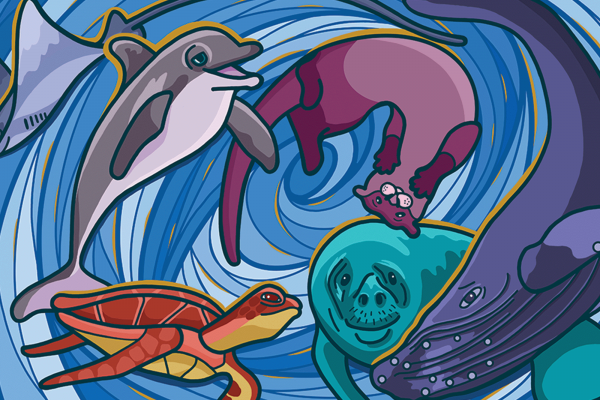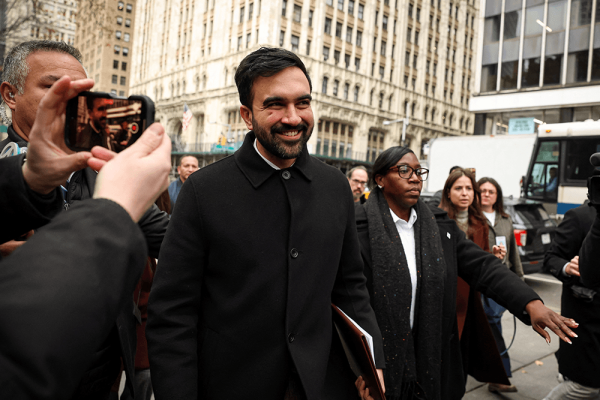DURING THE COP 28 climate change conference in Dubai, participants deliberated at length on the climate crisis and rightly set ambitious goals to address the challenges. As may seem natural, much of the conversation centered on securing a planet habitable for humans. But as Christians we must wrestle deeply with sharing God’s covenant with other creatures. Seeing creatures and the natural world as having no meaning other than how they serve human interest is a failure of human vision. The 2007 documentary Earth poignantly highlighted how an anthropocentric worldview and the human-caused environmental crisis have imperiled other creatures in a miraculously delicate system.
Perhaps out of species self-interest, much environmental work focuses on how climate shifts impact current and future human generations. But as people of faith, we can take a more wholistic view that also demonstrates commitment to the well-being of all God’s creation — animate and inanimate — because all are interdependent. In the context of the climate crisis, corrective justice requires addressing the concerns of communities disproportionately affected by climate collapse, as well as ensuring the welfare of nonhuman creatures. It is incumbent upon us to challenge the anthropocentric lens and champion biocentric approaches that affirm the sanctity of all life and creation. Our scripture readings this month present nonhuman creatures as equal partners on God’s planet and speak forcefully about their right to exist and thrive alongside our human communities. They feature animals dancing in open spaces, frolicking in the sea, and celebrating life in its fullness. Everything in nature reflects God’s glory, participates in God’s salvation, and reminds us of the divine presence.
May 5
Nature Celebrates God
Acts 10:44-48; Psalm 98; 1 John 5:1-6; John 15:9-17
PSALM 98 CELEBRATES divine salvation by inviting all people to make a joyful noise to the Lord, but it quickly shifts focus to the posture seas, rivers, and mountains take in their praise of God. In a beautiful image that might seem possible only in a Disney movie, the hills ring out with joy, all the lands sing with trumpets, and the whole earth and rivers join the party, clapping their hands to celebrate the redemption of the Lord.
The psalmist employs anthropomorphic language — “let the rivers clap their hands” (verse 8) and reveals nature’s full celebration at God’s party, but there is something deeper here. In the psalmist’s vision of the universe, the seas and rivers are not alien elements that need to be tamed by humans but are equal partners in celebrating divine salvation. The psalm even describes nature as fully capable of being in communion with God and participating in God’s joyful dance entirely apart from humans. It affirms God’s reign over the earth community and the people. God will judge both with equity, placing the natural world and humans on an equal plane. The psalmist’s depiction of nature as an equal partner invites us to treat God’s creation with respect and to acknowledge its worth and its ability to participate fully in God’s salvation. Disregard for the sanctity of nature may lull us into plundering the seas and hills in voracious pursuit of natural resources. Such avarice imperils our future and violates the psalmist’s vision of nature’s rightful place in God’s universe.
May 12
The Language of Trees
Acts 1:15-17, 21-26; Psalm 1; 1 John 5:9-13; John 17:6-19
THE PSALMIST USES two literary devices — juxtaposition and simile — to compare the righteous and unrighteous. The “wicked” are those who follow sinful ways and deride others. The “blessed” are those whose “delight is in the law of the Lord” (Psalm 1:2). Tight juxtaposition makes the point that God’s people are those for whom the law of the Lord is always their guiding principle. The simile stands out in the psalm. Those who delight in the Lord’s law “are like trees planted by streams of water” (verse 3). Like trees, they bear fruit in due season and have leaves that do not wither. The psalmist chose trees to symbolize moral beauty, commitment to the law of the Lord, health, and positive productivity. Trees represent the many ideal qualities to which God invites humans to aspire.
Indian poet Rabindranath Tagore, the first non-European to win the Nobel Prize for literature, wrote out of his deep love of nature. For Tagore, God was revealed in and through the natural world. “Trees are the earth’s endless effort to speak to the listening heaven,” he wrote in 1928, already anticipating the disastrous effects of deforestation. In “Bilaser Pha’ns” from Rabindra Rachanabali, Tagore’s deeply insightful collected works, he lamented: “The creator sent life, he made arrangements for nurturing it all around ... but man with his greed has supplied the instruments of death. ... Man has uprooted the very trees and vegetation which purify air, and falling leaves which make the land fertile.” Tagore was not deifying trees or other elements of nature, but he understood our interrelatedness and that respecting their sacredness is in everyone’s interest. In our own era of rapid deforestation, the celebration of trees offered by the psalmist and Tagore presents a powerful paradigm for our linked destinies.
May 19
A Frolicking Leviathan
Ezekiel 37:1-14; Psalm 104:24-35; Acts 2:1-21; John 15:26-27, 16:4-15
AFFIRMING THE SANCTITY of all life, Psalm 104 joyfully declares that the earth is full of living creatures who depend on the faithful provisions of God. In verse 24, the psalmist employs the Hebrew word chokmah (“wisdom”) to signal that God made these creatures with intricate creativity, care, and potential. All creatures — even Leviathan, the much-feared multiheaded serpent mentioned in Psalm 74:14 — reflect God’s chokmah, glory, and expertise. Leviathan has been vilified in much of Christian theology and history, but the psalmist makes a point here that God made Leviathan to “frolic” or “sport” in the sea (Psalm 104:26). The Hebrew word sachaq (“to play” or “laugh in pleasure”) implies that even this dreaded beast is capable of traits that humans cherish.
The psalm celebrates all creatures’ ability to thrive in their spaces without human disruption. But in verse 26 the psalmist notes the presence of ships in the sea with Leviathan frolicking joyfully nearby. In fact, the Leviathan is said to have been made in order to take ecstatic pleasure in the ocean, its playground. In the psalmist’s vision, human activity such as trade and travel did not undermine or harm the well-being of other creatures. As faithful readers of biblical texts, we have an obligation to build on these insights and ensure that the relationship between humans and the rest of creation is not defined in a zero-sum framework. Environmental activist and ecofeminist Vandana Shiva employs the phrase “democracy of all life” to encourage respect for the diversity of life and to offer a warning against attempts to tyrannize and conquer nature. She exhorts us to see nonhuman creatures as partners rather than as adversaries and to acknowledge the extent to which we are dependent on them for our survival.
May 26
Palace of God
Isaiah 6:1-8; Psalm 29; Romans 8:12-17; John 3:1-17
FOR 10 OF its 11 verses, Psalm 29 celebrates the universe without mentioning human beings. God is upon the mighty waters, and the waters and flood commune effortlessly and joyfully with God. The Lord sits enthroned on the flood and God’s glory is evident in the thunderstorm. As the Hebrew Bible scholar James L. Mays has noted, “Psalm 29 is the only text in the Old Testament in the which the glory of the Lord is so extensively and directly said to be manifested in what we moderns call natural phenomena.” He observes that the psalm “looks to the heavenly realm and imagines the cosmic palace of God.”
With so many verses describing God’s mighty universe, where are the humans in the psalmist’s imagination? I realized that the decentering of humans is likely not an omission, but the point of the psalm. An implication of this way of reading is that nature can exist without humans, but humans cannot exist without nature. Some Christian traditions still perpetuate anthropocentric theologies, believing that humans must be centered because we were created in God’s image and therefore deserve all blessings, isolating us from the rest of creation. This way of thinking rarely calls attention to God’s special relationship with nonhuman creatures, which the psalmist highlights here. Scripture invites us to acknowledge the glory of creation and grant it the dignity and respect it deserves and thereby honor its creator. May the words of the psalmist guide us in our deepening relationships with all of creation.

Got something to say about what you're reading? We value your feedback!







